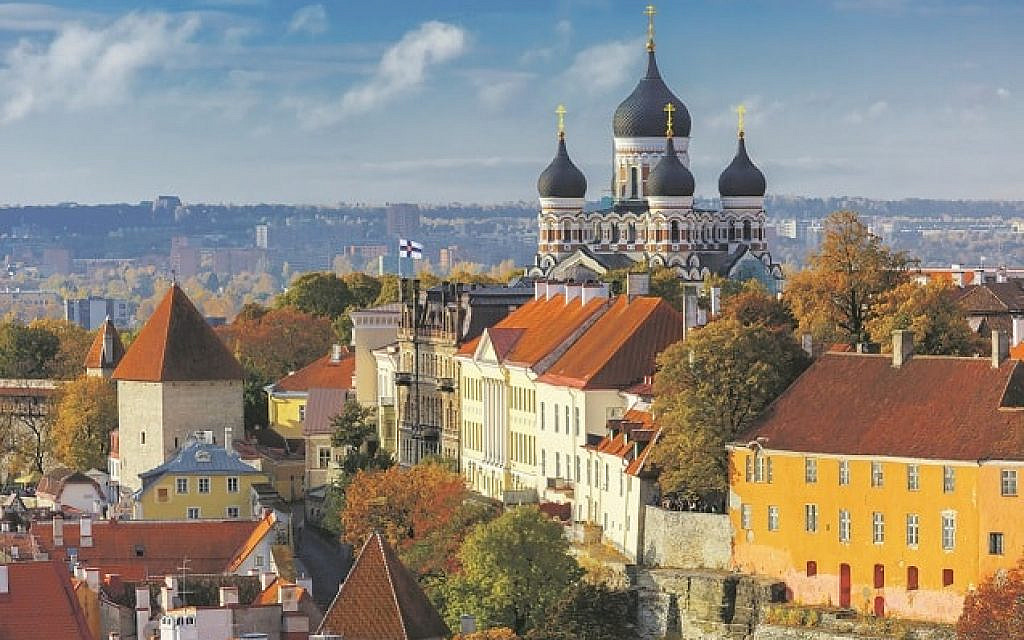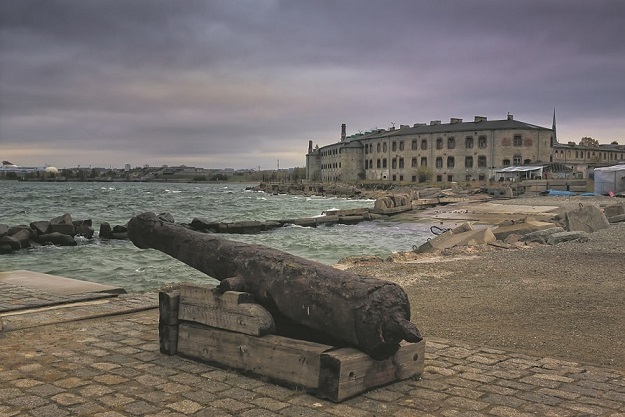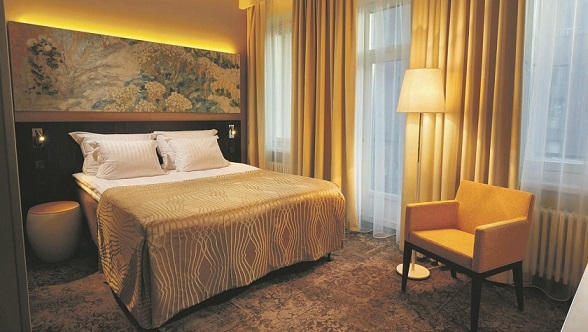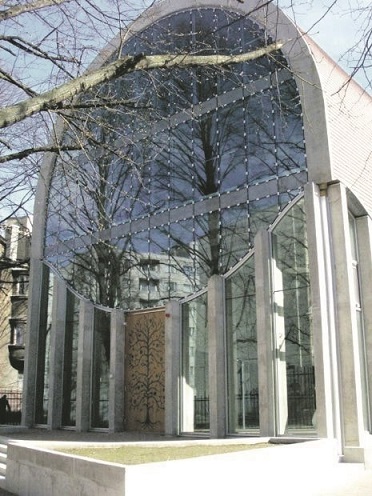Tallinn tales!
Andrew Kaye discovers a communist past, high-tech future and hope for the Jewish community in Estonia’s capital city
Suspended high above the din of Tallinn’s cobblestoned streets, we were greeted by a magnificent panorama in which Alexander Nevsky Cathedral competes with the gothic Holy Spirit Church for the attention of day-tripping tourists.
Here at the Kohtuotsa Viewing Platform, there is possibly no better place to orientate oneself to the Estonian capital – but being simple folk, we were simply scoping out where to eat our first lunch.
We finally settled on Kohvik Moon, which specialises in modern Russian fare and where culinary connoisseurs are in for a treat. I tucked into orange and honey-glazed salmon, while my partner’s pike fishcake came in a vermouth sauce.
Get The Jewish News Daily Edition by email and never miss our top stories Free Sign Up
Soon, though, we felt the need to walk off the many servings of rye-bread and properly acquaint ourselves with the city.
First we passed by the Tsarist naval base close to the abandoned Patarei prison, which provided a stark reminder that for all the city’s modern temptations, it has a rich, and often uncomfortable history harking back to its Soviet past.
Intriguingly, the site is readying itself for development, but the successful buyer must meet one condition: they have to dedicate space to an International Museum for the Victims of Communism.
The site contrasts with the nearby Lennusadam, a seaplane harbour, where families can step into and explore submarines.
Wherever we walked in the city, and it is highly walkable, we were confronted by Tallinn’s contradictions between a Communist past and a high-tech future.
It was here that Skype was born, and where the Telliskivi Creative City’s Fotografiska space has already opened. The same venture, promising world-class photography, is planned to open later this year in Whitechapel.
Dazzled by the neon blues of Telliskivi’s street art, Kalamaja neighbourhood makes for a tranquil pitstop.
The wooden houses built 100 years ago, still stand here today – just. Some are the same colour as glazed apple pastries on display in nearby cafes.
For history buffs, Tallinn is the gift that keeps on giving. On our second day, we browsed Raekoja Plats, the main square.
There are gabled 13th century merchants’ houses, handsomely terraced just metres from the old KGB detention cells.
Just 10 minutes away, we went on a tour of the old KGB listening-post at the Hotel
Viru – a must for anyone who recently watched Chernobyl, or simply loves a chilling story.
Magrit, our guide, remembered the stultifying days of Soviet rule. The Viru was targeted at tourists who came to stay in the 1970s and 1980s. Some used to joke on their return to the West that the hotel was a miracle; it was “made of both concrete and microphones”, and Magrit left none of us in any doubt that for nearly two decades, guests were being spied on.
Away from the city centre, there are marvellous walks in the Kadriorg park, which is where Peter the Great gifted his wife Catherine I with a baroque palace. Mon Repos made for a splendid place to rest, situated close by. For lunch, I indulged in a dish of chanterelles and caper cream-cheese gnocchi.
Next came the modern art museum, Kumu, said to be the best gallery in the Baltics. However, the undoubted highlight of the whole trip was an organised visit to meet with Rabbi Kot of the Beit Bella synagogue.
He warmly welcomed me into the wondrous building, opened in 2007, which followed six decades during which not a single synagogue existed in the whole of Tallinn.
The building is now at the heart of Estonian efforts to rebuild Jewish community life. The country is believed to have a population of just under 2,000 Jews, but projects are underway to help the community grow. There is a mikveh on-site and a Hebrew school. For a city where all Jewish life was extinguished during the Second World War, and prohibited during the Soviet era, Rabbi Kot added that now was the time for the community to cherish “freedom”.
For all of Tallinn’s inhabitants, and on the 30th anniversary since the country’s famed Singing Revolution overcame Communism, freedom is perhaps prized above all else.
Andrew’s travel tips:
Andrew stayed at Hotel Palace Tallinn, where double rooms can start from £120 a night www.tallinnhotels.ee/hotel-palace-tallinn. Flights from £40 single can be booked with Wizz Air, www.wizzair.com

Thank you for helping to make Jewish News the leading source of news and opinion for the UK Jewish community. Today we're asking for your invaluable help to continue putting our community first in everything we do.
For as little as £5 a month you can help sustain the vital work we do in celebrating and standing up for Jewish life in Britain.
Jewish News holds our community together and keeps us connected. Like a synagogue, it’s where people turn to feel part of something bigger. It also proudly shows the rest of Britain the vibrancy and rich culture of modern Jewish life.
You can make a quick and easy one-off or monthly contribution of £5, £10, £20 or any other sum you’re comfortable with.
100% of your donation will help us continue celebrating our community, in all its dynamic diversity...
Engaging
Being a community platform means so much more than producing a newspaper and website. One of our proudest roles is media partnering with our invaluable charities to amplify the outstanding work they do to help us all.
Celebrating
There’s no shortage of oys in the world but Jewish News takes every opportunity to celebrate the joys too, through projects like Night of Heroes, 40 Under 40 and other compelling countdowns that make the community kvell with pride.
Pioneering
In the first collaboration between media outlets from different faiths, Jewish News worked with British Muslim TV and Church Times to produce a list of young activists leading the way on interfaith understanding.
Campaigning
Royal Mail issued a stamp honouring Holocaust hero Sir Nicholas Winton after a Jewish News campaign attracted more than 100,000 backers. Jewish Newsalso produces special editions of the paper highlighting pressing issues including mental health and Holocaust remembrance.
Easy access
In an age when news is readily accessible, Jewish News provides high-quality content free online and offline, removing any financial barriers to connecting people.
Voice of our community to wider society
The Jewish News team regularly appears on TV, radio and on the pages of the national press to comment on stories about the Jewish community. Easy access to the paper on the streets of London also means Jewish News provides an invaluable window into the community for the country at large.
We hope you agree all this is worth preserving.
-
By Laurent Vaughan - Senior Associate (Bishop & Sewell Solicitors)
-
By Laurent Vaughan - Senior Associate (Bishop & Sewell Solicitors)
-
By Laurent Vaughan - Senior Associate (Bishop & Sewell Solicitors)
-
By Laurent Vaughan - Senior Associate (Bishop & Sewell Solicitors)

























